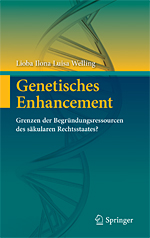Legal Perspectives on Genetic Enhancement

© Springer Verlag
Rapid developments in the life sciences have recently sparked increasing debates regarding alterations of human nature. This process, the very effects of which seem to endanger this nature itself, has reached new levels by not only allowing for therapeutic treatments, but also providing for the improvement of our genetic dispositions. Because these developments hold such tremendous importance regarding the collective identity, self-understanding and self-perception of humankind, they have triggered an ever-growing number of ethical, political and legal debates, all of which reveal far-reaching controversies.
The author discusses the current legal permissibility of procedures aiming at improving the human genome and analyzes options for future legal ruling taking into account various, not only legal, aspects. She raises the question of which sources suffice to justify a legal prohibition of techniques of genetic enhancement, i.e. whether an indisposability of the natural and contingent human genome can be justified in a secular, religiously neutral and constitutional legal system, or if such an inviolability of the nature of humankind can only be safeguarded by a state which - opposing John Rawls' doctrine of Political Liberalism, which requires the liberal constitutional state to solely rely on the principle of public justification - does not refrain from religious and transcendent foundations for legal rulings. In other words, has the secular legal system reached its systematic limits when it comes to current bioethical challenges?
Literature: Welling, Lioba Ilona Luisa: Genetisches Enhancement. Grenzen der Begründungsressourcen des säkularen Rechtsstaates?, Berlin et al.: Springer 2014.

